| کد مقاله | کد نشریه | سال انتشار | مقاله انگلیسی | نسخه تمام متن |
|---|---|---|---|---|
| 910339 | 1473069 | 2015 | 8 صفحه PDF | دانلود رایگان |
• We experimentally induced anger and depressive rumination in the laboratory.
• Level of Borderline Personality Disorder (BPD) features was examined as a potential moderator.
• Findings on change in emotion, shame, self-blame, and self-forgiveness are reported.
Background and objectivesRecent studies have suggested that types of rumination differ on how they impact psychopathology. Few research studies, however, have compared the two types of rumination. The primary aim of this research was to examine the effects of anger rumination and depressive rumination on factors related to self-conscious experiences (shame, self-blame, self-forgiveness) and negative affect among individuals with varying levels of borderline personality disorder (BPD) features.MethodsParticipants (N = 120), screened for BPD features, were randomly assigned to an anger or depressive mood induction followed by a rumination induction. Participants then completed self-report measures of emotional state and self-conscious experiences.ResultsIn both anger and depressive rumination conditions, participants reported significantly increased negative affect and decreased positive affect relative to their baseline measurements. Participants with elevated levels of BP features reported higher levels of self-blame and shame. In the low-BPD group, self-blame levels were higher following depressive rumination compared to anger rumination.LimitationsDue to resource constraints this study lacked a control condition involving no rumination. The range of BPD features was also restricted due to the use of a non-clinical sample thereby limiting the ability to examine BPD features as a moderator.ConclusionsDespite the limitations, the current study is one of few investigations comparing the differential effects of induced anger rumination and depressive rumination on affect and self-conscious experiences. This study also addresses an important gap in literature on the mechanisms by which rumination influences negative affect.
Journal: Journal of Behavior Therapy and Experimental Psychiatry - Volume 46, March 2015, Pages 27–34
